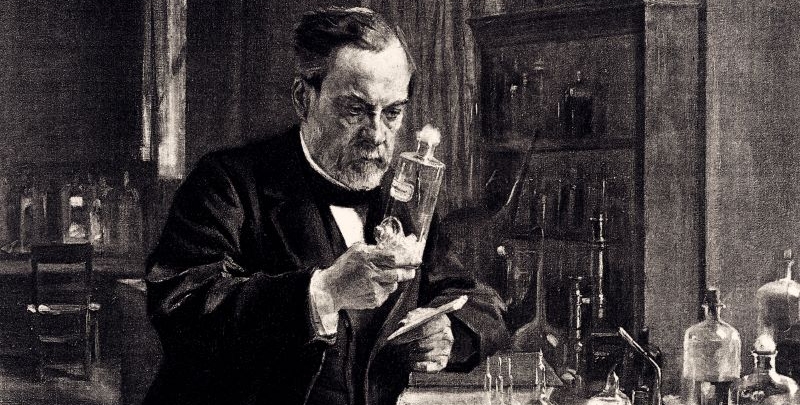|By J. Robert Parks|
December 27 marks the 200th anniversary of the birth of Louis Pasteur. Pasteur’s contributions, especially in the fields of chemistry and microbiology, are foundational to modern science, and his developments in the areas of vaccines and immunology are particularly relevant today. Gale In Context: World History has a rich collection of resources for librarians and teachers who want to examine aspects of Louis Pasteur’s life to help students understand everything from the scientific method to how vaccines work to the germ theory of disease.
Louis Pasteur was born in 1822 in humble circumstances in eastern France, but he received a strong education in local schools and went on to study at the Royal College in Besançon and then the École Normale Supérieure in Paris. There he became interested in chemistry. His initial studies were in crystallography, as he used microscopes to study the shapes of crystals. While he was still in his 20s, he discovered that organic molecules are asymmetrical.
In 1856, the father of one of his students asked Pasteur to conduct an experiment on why certain batches in his brewery spoiled while others stored under the same conditions did not. Pasteur’s investigation led him to discover that microorganisms could contaminate the fermentation process. If beer and other liquids, such as wine, vinegar, and milk, were heated to 68 degrees Celsius for a short period of time, however, it would kill those organisms. The result would be that the liquid would then be sterilized and would resist fermentation or other kinds of degradation. The process became known as pasteurization.
As Pasteur’s reputation grew, the French Department of Agriculture chose him to lead a commission to determine the cause of the disease that was killing silkworms and destroying the French silk industry. Pasteur knew little about biology so he had to educate himself, but the result was that he determined how to tell if a silkworm was free of disease by using a microscope—which he then taught silkworm farmers how to use.
In a different experiment Pasteur conducted in 1862, he cultured air samples from Paris and compared them to samples from high in the mountains, where the culture was sterile. He was able to show that spontaneous generation—the belief that microorganisms spontaneously generate in rotting tissue—was not the genesis of germs. Rather, germs were already present in the environment and then multiplied when coming into contact with organic matter. By the end of the 1870s, Pasteur had helped discredit the idea of spontaneous generation, a belief that had been widely held for centuries.
Pasteur’s work on germs was enormously influential and laid the groundwork for many other discoveries involving medicine and bacteriology. He also furthered the understanding of immunology and how disease could, in some cases, be its own preventive. In other words, if the disease could be made milder, that disease could make a subject immune to the stronger version of the disease. His experiments with inoculated chickens led to a greater understanding of how vaccines could create immunity. His successful work with fowl cholera led him to focus on anthrax, a disease that could be deadly for humans but was especially destructive to sheep and cattle.
In this work, Pasteur was not alone, as other scientists such as Jean Joseph Henri Toussaint were also working to create an anthrax vaccine. In 1881, however, Pasteur announced the production of an anthrax vaccine that was demonstrably effective and also attenuated enough that it was nonlethal to animals and humans. Pasteur’s continued experiments showed that these vaccinations were effective, but that some animals needed to be revaccinated annually. He also learned that some vaccines could deteriorate over time. Pasteur would go on to develop a vaccine against swine erysipelas, and then work for years on developing a vaccine for rabies.
Students or teachers looking for a thorough biography of Pasteur and detailed description of his many scientific discoveries will enjoy this extensive article.
About the Author
J. Robert Parks is a former professor and frequent contributor to Gale InContext: U.S. History and Gale In Context: World History who enjoys thinking about how our understanding of history affects and reflects contemporary culture.


